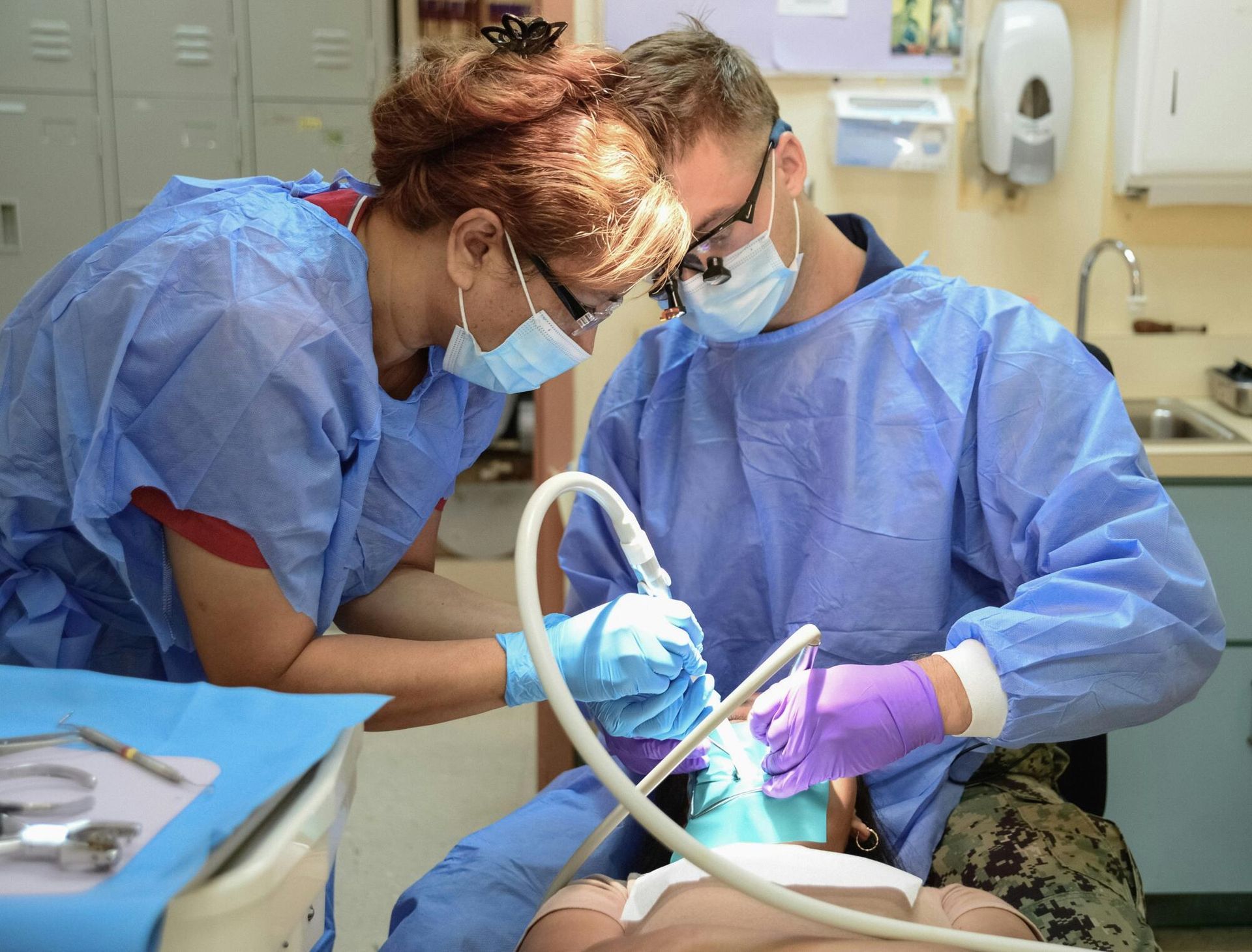When Everyday Actions Hurt: Recognizing the Impact of TMD Symptoms
TMJ and TMD symptoms can turn simple, everyday activities into unexpected challenges. From chewing and talking to yawning or even smiling, what once felt effortless may now bring pain, stiffness, or clicking sensations in the jaw. These discomforts often signal an underlying problem with the temporomandibular joint, a situation that can gradually impact your overall comfort and quality of life if left untreated.
At Dental Care Burke, Dr. Bernard W. Lynch provides advanced care for patients struggling with TMD. Combining medical precision with compassionate understanding, Dr. Lynch helps patients identify triggers, manage pain, and restore natural jaw function through personalized, neuromuscular treatment plans.
Understanding how daily actions influence TMD symptoms is the first step toward lasting relief.
Understanding What Causes TMD Symptoms
TMD, or temporomandibular joint disorder, occurs when the jaw joint and surrounding muscles don't function properly. This condition can stem from multiple sources, including stress, muscle tension, arthritis, or past injury. It's also common for patients to develop habits that unintentionally strain the joint over time, such as teeth grinding or jaw clenching during sleep.
Many working adults experience mild discomfort that worsens with routine activities. Persistent tension can cause headaches, jaw soreness, or radiating pain near the ears and temples.
When left untreated, these early warning signs can evolve into chronic pain or restricted movement that disrupts eating, speaking, and rest. Recognizing and addressing these issues early ensures better long-term outcomes.
Daily Habits That Impact TMD
Small, everyday actions can have a significant impact on jaw health. Many patients don't realize how often they engage in behaviors that increase tension and inflammation in the temporomandibular joint.
1. Teeth Grinding and Clenching
Bruxism, or unconscious grinding, often occurs during stressful moments or while sleeping. Over time, it wears down teeth and overloads the jaw muscles.
Nightguards or custom splints can prevent damage and reduce strain during rest. Tracking nighttime clenching in a symptom diary can help identify patterns and alleviate TMD triggers.
2. Poor Posture
Sitting hunched over a computer or phone can misalign the neck and jaw. This subtle imbalance places additional pressure on the TMJ, leading to stiffness and headaches.
Corrective posture and ergonomic adjustments are essential for TMD symptom management. Regular breaks and gentle stretches can further relieve tension.
3. Chewing on One Side
Favoring one side when chewing can create muscle imbalances. This uneven wear and movement can make one joint work harder, which increases the likelihood of soreness or popping noises. Rotating sides while eating supports balanced muscle use.
4. Nail Biting and Gum Chewing
Frequent nail biting or gum chewing may seem harmless, but they repeatedly engage and fatigue the same jaw muscles. Reducing these habits can significantly ease discomfort.
5. Eating Hard or Chewy Foods
Steak, bagels, or tough snacks require more force to chew, which can irritate inflamed joints. Soft foods and gentle chewing can help during a flare-up. Patients can learn how long a typical TMJ flare-up lasts and plan meals accordingly.
Recognizing the Subtle Signs of TMD
TMD doesn't always start with severe pain. In fact, the earliest symptoms are often subtle, such as a light clicking sound when opening the mouth or a sensation of fatigue after speaking for long periods. Over time, these signs can intensify and begin to affect daily function.
Common TMD symptoms include:
- Jaw clicking, popping, or grinding
- Facial or ear pain
- Limited jaw movement
- Morning headaches or neck stiffness
- Tooth sensitivity without dental decay
Addressing these symptoms early helps prevent progression to chronic conditions. Dr. Lynch's approach at Dental Care Burke focuses on identifying the exact source of dysfunction and crafting a plan that corrects both pain and alignment. To better understand the potential causes of jaw pain, you can review detailed insights about muscle tension, inflammation, and bite patterns linked to TMD.
How TMD and Lifestyle Choices Affect Jaw Health
Every aspect of daily life, from diet to stress management, influences jaw function. Chronic stress can trigger clenching, while lack of sleep or poor nutrition can slow muscle recovery and increase inflammation. Sleeping on your back or using a supportive pillow can reduce nighttime jaw strain.
Practicing mindful self-care plays a major role in managing TMD symptoms. Dr. Lynch encourages patients to adopt small but effective changes like adjusting workstation setups, performing relaxation techniques, and maintaining hydration for joint support. Gentle jaw exercises or neck stretches, performed daily, can improve flexibility and reduce tension.
For patients seeking additional at-home strategies, natural TMJ remedies provide guidance on heat therapy, stretching, and anti-inflammatory dietary adjustments. Keeping a daily symptom journal helps identify triggers, which is valuable for long-term TMD management.
How Neuromuscular Dentistry Helps Restore Balance
Unlike traditional dental approaches that treat surface symptoms, neuromuscular dentistry addresses the relationship between the jaw joints, muscles, and teeth alignment. By identifying the natural position of the jaw and training muscles to function correctly, patients experience pain relief that lasts.
Dr. Lynch, a Fellow of the Academy of General Dentistry and graduate of Tufts University School of Dental Medicine, uses advanced technology to measure bite alignment and muscle activity. His training from the Las Vegas Institute for Advanced Dental Studies (LVIF) gives him expertise in restoring proper jaw balance through modern, science-based techniques. Patients can learn more about the dental tensing procedure to understand how treatment works.
When TMD Affects More Than Just the Jaw
Many people don't realize that TMD can also influence other areas of health. Headaches, shoulder tightness, and even ear ringing (tinnitus) can stem from the same source: an unbalanced bite or strained jaw muscles. Studies show that the temporomandibular joint closely interacts with the cervical spine and surrounding nerves, which explains why discomfort can radiate to other parts of the body.
Mental health can also play a surprising role. Chronic pain often leads to anxiety or disrupted sleep, creating a feedback loop that intensifies physical symptoms. For guidance on this connection, read more on TMJ and anxiety.
Finding Relief That Fits Your Lifestyle
Managing TMD requires a personalized approach that aligns with your unique symptoms and lifestyle. Dr. Lynch takes the time to evaluate every aspect of your oral health, from bite position to muscle tension patterns, ensuring that each treatment plan supports long-term comfort and stability.
Patients can explore customized solutions ranging from at-home self-care to advanced therapies performed in-office. By incorporating proper posture, gentle exercises, and awareness of daily triggers, patients can significantly reduce flare-ups and support long-term jaw health. Additional TMJ relief strategies help patients combine professional care with effective home practices.
Including information about diet, hydration, and stress reduction can further optimize outcomes. Patients may also benefit from learning about the link between jaw alignment and sleep quality, which often goes unaddressed.
Integrating Care Into Daily Life
Working adults often underestimate how daily habits affect TMD. Small changes, like stretching your jaw during breaks, practicing mindful posture, and limiting hard or chewy foods, can make a big difference.
By modifying routines and seeking professional guidance, you can minimize flare-ups and protect long-term jaw health. Incorporating expert neuromuscular dentistry, such as the care provided by Dental Care Burke, helps restore comfort, functionality, and confidence.
Frequently Asked Questions
What Should I Bring to My First Specialist Visit for TMD?
Bring any recent dental or medical records, a symptom diary, and a list of medications. Include lifestyle notes such as jaw-clenching habits or posture concerns. These details help the dentist create a precise, individualized plan.
How Long Do TMD Treatments Usually Take to Show Results?
Many patients notice improvement within 4-6 weeks when combining self-care strategies with professional treatment. Complex neuromuscular adjustments may require several months for optimal alignment and relief.
Can Stress Really Make TMD Symptoms Worse?
Yes. According to the Guardian wellness report, stress contributes to jaw-clenching, which worsens TMD symptoms. Managing stress is critical in successful TMD symptom management.
Are There Risks if I Leave TMD Untreated?
Chronic, untreated TMD can lead to muscle fatigue, frequent headaches, sleep disturbance, and long-term bite changes. The National Institute of Dental and Craniofacial Research recommends professional evaluation to prevent complications.
Is Surgery Always Required for TMD?
No. Most cases improve with conservative treatments like posture correction, relaxation exercises, night guards, and dietary adjustments. Surgery is a last resort for structural issues that do not respond to non-invasive care.
How Can I Prevent TMD Flare-Ups Once Treatment Works?
Maintain a soft diet when possible, keep good posture, wear a night guard if recommended, and practice daily jaw relaxation exercises. Regular check-ups ensure long-term stability and comfort.
Personalized TMD Relief for Your Lifestyle
Understanding TMD symptoms and their triggers empowers patients to regain control over daily life. At Dental Care Burke, Dr. Bernard W. Lynch and his team combine advanced techniques, personalized care, and compassionate guidance to deliver lasting relief.
With expertise in neuromuscular dentistry, our practice addresses the root causes of discomfort while providing individualized treatment plans. Our approach ensures patient comfort, accuracy, and excellent outcomes.
Proactively addressing habits, tension, and posture while leveraging professional evaluation can reduce the impact of TMD on work, sleep, and overall well-being. By reaching out to Dental Care Burke, managing TMD becomes a manageable and effective part of daily life.












